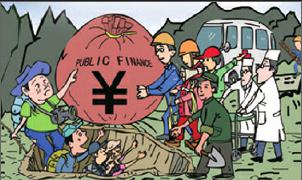Should the Public Pay for Tourists’Recklessness?
2015-11-05

Seventeen campers who were successfully rescued on October 5 after having become trapped in the Changtanhe Nature Reserve in southwest Chinas Guangxi Zhuang Autonomous Region have been fined 1,000 yuan ($157.2) each for entering the nature reserve without permission.
Some netizens have demanded that the campers involved should also pay compensation for the expenses incurred in their rescue. However, the publicity department of Laibin, the jurisdiction of which the nature reserve in question falls, stated as a public service provider that the government has the responsibility to carry out search and rescue operations and that the campers were entitled to be saved as they are all taxpayers. At present, there are no clear laws and regulations in place that justify demanding compensation from the rescued parties.
The government should pay
Zhu Yonghua (Beijing Times): Offering help and rescue whenever the need arises is the principle guiding the use of public resources for rescue. Conversely, selective rescue factoring in costs goes against humanitarian values and the very raison detre of such resources being available in the first place. This will leave trapped people in a desperate situation and cause the public to lose trust and faith in public rescue services. In life-anddeath situations, public rescue authorities should not calculate costs and gains.
That said, it was more than reasonable to fine the 17 campers. However, were public rescue authorities to claim compensation for the rescue, it would cause irreversible damage to the reputation of the system.
Laws and regulations needed
Shu Rui (Xian Evening News): As to the question of who should bear the cost of rescue missions, these expenses in the first instance should be apportioned into two parts: expenses of public resources and non-public ones.
As for public resources expended by the police and other responsible government departments, the country is legally liable to aid its citizens regardless of the kinds of dangers they face and the causes underlying their predicament. Many may argue that the government should not pay for remedying hazardous situations resulting from illegal actions because this is unfair on law-abiding members of society. Nevertheless, there is no contradiction present in offering help to citizens who transgress the law while at the same time punishing them for legal infringements.
Non-public service providers or agencies mobilized by hospitals, professional rescue institutions and members of the public not legally obligated to carry out rescue work and holding the same civil status as the rescued party should be compensated by those whom they help.
Its unfortunate that in many cases, the government has been forced to pay for rescue operations made necessary by reckless misadventure, thus placing the burden on the taxpayer.
Moreover, as the frequent occurrence of accidents involving adventurers has now become a problem for society at large, relevant legislation should be put in place to regulate outdoor expeditions, so as to more evenly spread out the cost of potential rescue operations.
Xie Qingfu (China Youth Daily): There is no doubt that trapped expeditionists should be rescued in a timely fashion once they have called for help. Nevertheless, these adventure tourists should also take on their fair share of the responsibility having been rescued. An expedition is distinct from normal tourism activities. If accidents happen in a tourist destination with a full complement of facilities and good management, the costs of rescue by police or firefighters should be covered by public finance. In such circumstances, it is not the fault of the tourists involved and as taxpayers, they have the right to enjoy public services including rescue services.
With expeditions, on the other hand, tourists are informed about the potential dangers of ventures beforehand but undertake them anyway. In cases such as these, it is transparently inappropriate for rescue costs to be taken entirely from the public wallet.
Laws and regulations should be formulated to clarify the responsibilities and obligations held by adventurists and to punish offenders who flout regulations designed to protect them.
For instance, the magnitude of a fine dealt out to the subject of a rescue should be in proportion to the number of personnel involved. If rescuers are injured or perish in the course of their duty, the rescued party should not only pay fines but also be held liable for compensation.
It should be noted that rights and obligations should go hand in hand. When adventure tourists who break the law are in danger, the government should spare no effort in attempting to save them. On the flipside, such tourists should be punished for violation of laws. At the end of the day, the best protection for the well-being and safety of adventure-seekers may be to set up laws restricting their behaviors.
Fu Xiangjun (Xian Daily): Lending a helping hand to outdoors enthusiasts in peril represents the governments loyalty to its duties and its respect for citizens right to life. Nonetheless, this is not to say that tourists should be allowed to get away with breaking the rules in order to access dangerous regions.
As adults, adventure tourists have to be held responsible for their actions and the ensuing consequences. They should be expected to have the necessary foresight and make preparations to counter the risks inherent in outdoor sports and be made to pay the price for instances of misconduct. This is not only in keeping with the legal spirit of the equity of responsibility, rights and benefits, but also with the requirement for citizens to possess a sense of self-discipline, safety and social responsibility.
Whether carried out by government departments or non-government organizations, rescue operations will inevitably incur costs. For instance, in order to rescue the campers from the Changtanhe Nature Reserve, over 100 policemen and firefighters, 200 government workers and civilians, more than 40 doctors and nurses and 300 logistics personnel were dispatched and more than 80 vehicles of all types in addition to steamboats were mobilized, sticking authorities with a bill of over 100,000 yuan. If these expenses are shouldered by the government, the burden will be transferred to taxpayers. This will not only be unfair but also encourage similarly reckless expeditions in the future.
In some countries where outdoor rescue systems are more developed, according to law, the families of the rescued are required to pay at least some of the expenses. However in China, no protocol for outdoor rescues exists nor do any special laws stipulating legal and financial responsibilities in cases where rescue operations are needed.
For some time now, the practice of using public funds to rescue trapped or isolated tourists has stirred much controversy. The fact that few adventurers shoulder their civil responsibilities or have faced administrative penalties for misconduct has aroused public discontent.
Revising and fine-tuning the relevant laws and regulations to clarify legal responsibilities in outdoor sports and ensure reasonable distribution of costs is therefore an urgent matter. One idea might be to make insurance a prerequisite when undertaking dangerous expeditions. The fining of the tourists in Guangxi has set an example for others who think themselves above the rules. It will serve as a reminder for tourists to develop a sense of responsibility for oneself, others around you and society at large.
Safety first
Jiang Jingjing (Xinan Evening News): Its a shame that more adventure tourists do not draw lessons from the misfortunes that have befallen their brethren, given the recent avalanche of such incidents. Many hikers and climbers have created huge trouble for others while putting themselves in a position of peril.
The most urgent thing at present is to bolster the skills and knowledge possessed by outdoor tourists. They should be equipped with sufficient training in various techniques, furnished with the necessary knowhow, and have the ability to assess risk and take responsibility for their own lives. The popular misconception that the primary purpose of expeditions into the wilderness is to demonstrate ones bravery and machismo should be consigned to the trash and expeditionists should try to accrue more relevant experience and become more measured in their approach.
